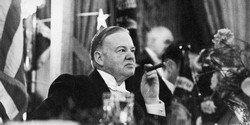Hoover And The Depression
|
| updated |
Copy Link Code
|
 On Thursday, October 24, 1929, the stock market crashed, barely eight months after Herbert Hoover took the oath of office to begin his term as President of the United States. Hoover thought the stock crash was just part of a recession that would pass; so did many economists and business leaders. Herbert Hoover would spend his entire presidency trying to ward off of what the stock market crash led to: The Great Depression. A global economic slowdown and over-speculation brought the worst financial crisis the U.S. had known before or since.
On Thursday, October 24, 1929, the stock market crashed, barely eight months after Herbert Hoover took the oath of office to begin his term as President of the United States. Hoover thought the stock crash was just part of a recession that would pass; so did many economists and business leaders. Herbert Hoover would spend his entire presidency trying to ward off of what the stock market crash led to: The Great Depression. A global economic slowdown and over-speculation brought the worst financial crisis the U.S. had known before or since.
President Herbert Hoover had long been a supporter of private and public collaboration and cooperation; he felt this interaction was the best way to accomplish long-term growth that was healthy and prosperous for all. Hoover also opposed heavy government involvement in the business world, because it would breed dependency on government and cripple self-reliance, both essential elements of a strong nation. Unfortunately, Hoover's ideals failed when the Great Depression put them to the test.
President Hoover during the Great Depression worked hard to fix the economy:
- He formed new government agencies to address specific problems
- He supported labor rights and harmony with business owners
- He encouraged government and businesses to stabilize prices
- He tried to keep the federal budget balanced, a determination that would cost him dearly.
President Herbert Hoover felt that the part of the answer to the Great Depression lay in indirect relief from the states, the private sector and "appealing for funds from outside" the government.
The Great Depression, however, worsened, demanding more government intervention, but Hoover refused to allow it, fearing a movement toward socialism. While Hoover was supportive of giving aid to banks, he would not approve direct government aid to the citizens. What quickly emerged in the public's eye was an uncaring man who would let the entire nation sink into starving poverty before he would release available federal money to help them. Hoover was unsuccessful in convincing the American people that giving federal aid to citizens would be destructive in the long run, and that it would destroy the government's foundation by building deficits and social disorder. This attitude was the major element in his being defeated by Franklin Roosevelt in 1932.
Hoover's reaction and response to the Great Depression
President Hoover's reaction to the Great Depression was strict and decisive. While people continued to add to the bread lines and unemployed, he remained steadfast in his conviction that government should only play an indirect role in aiding the population. He searched for ways to cut corners and save money in order to maintain a balanced budget and not plunge the U.S. into debt, which he saw as a long-term deficit that would weaken the country. Hoover took a laissez-faire approach to the Depression, which gained him criticism from people everywhere.
Hoover responded to the Great Depression by:
- Pressuring business leaders to refrain from lying off workers or cutting wages; he wanted prices to stabilize, which was difficult because commodities rise and fall with the economy. If there is an increase in demand, there is an increase in production because the goods have a market, but that wasn't the case during the Great Depression.
- Investing some federal money in public works programs and ship construction during 1929. In 1930, he approved the building of Hoover Dam and the continuance of the Federal Farm Board to loan money to farmers as well as buy excess production. Hoover advocated for and signed the Glass-Steagall Act of 1932 to discount money, which allowed for more inflation of credit and bank reserves.
By the end of 1932, unemployment was at almost 25%, businesses were forced to default on major loans and over five thousand banks had closed their doors. Americans, by the hundred thousands were homeless and desperate. They began forming "Hooverville" shanty towns in cities, bread lines worsened, people fell deeper and deeper into poverty, but Herbert Hoover would not provide direct government aid for the welfare of the people.
Please visit great-depression-facts.com for more information about the Great Depression.
